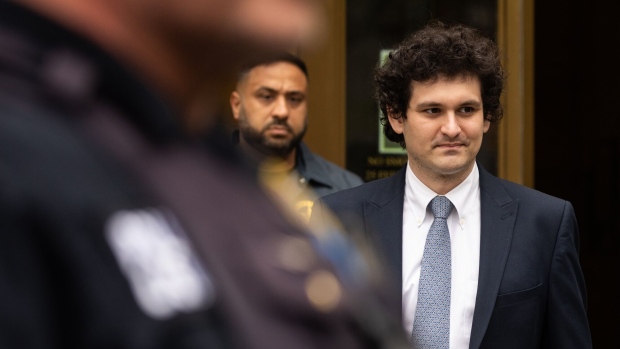Oct 25, 2023
SBF to Testify in Fraud Trial After Onslaught From Inner Circle
, Bloomberg News

(Bloomberg) -- Sam Bankman-Fried will take the stand to defend his actions in the lead-up to the collapse of his digital-asset empire, after taking a beating from former colleagues who described him as the mastermind of a years-long scheme to defraud FTX customers and investors.
Bankman-Fried’s lawyers said on a conference call with the judge Wednesday that their client will testify at his fraud trial after the prosecution finishes its case. The 31-year-old could take the stand, barring a last-minute change, as soon as Thursday afternoon.
The once respected crypto mogul is facing decades in prison on charges that he directed the transfer of FTX customer money into Alameda Research, an affiliated hedge fund, for risky investments, political donations and expensive real estate before both companies spiraled into bankruptcy last year.
While defendants often avoid testifying — a move that can easily cause more harm than good — it’s one of Bankman-Fried’s final defense options after facing weeks of damaging testimony from former members of his inner circle.
“He couldn’t stop talking to press and wider world after FTX collapsed and before he was arrested and then while out on bail so no one should be surprised that he is choosing to take the stand,” said Brian Klein, a former federal prosecutor.
Three of Bankman-Fried’s closest confidantes, Alameda Chief Executive Officer Caroline Ellison, FTX’s former head of engineering Nishad Singh, and Gary Wang, a co-founder of the crypto exchange, pleaded guilty to fraud and cooperated with prosecutors. On the stand, all three pointed at Bankman-Fried as the one calling the shots when customer funds were misused.
After those witnesses, Bankman-Fried’s testimony will be “rearranging the deck chairs on the Titanic,” Klein said.
Prosecutors said on the call that they will have one more witness Thursday morning, an FBI agent, who will summarize chats that were automatically deleted.
Lawyers for Bankman-Fried said they also anticipate calling three witnesses before their client, including Joseph Pimbley, a financial expert, who will testify about Alameda’s line of credit and FTX’s spot margin program.
Closing arguments are likely to take place early next week, with the jury to begin deliberations soon afterward.
Bankman-Fried’s lawyers had signaled it was possible he could testify. They complained to Judge Lewis Kaplan on Oct. 15 that their client wouldn’t be able to “meaningfully participate” in the trial if he didn’t get his full dose of Adderall — a drug they’ve said he needs to treat his ADHD. He has since gotten access to the medication.
Read More: SBF Lawyers Say FTX Co-Founder May Need Adderall to Testify
Bankman-Fried’s testimony will be the first time the public will hear from him in months. The FTX co-founder agreed to a gag order in July, largely preventing him from talking to the press. A month later he was sent to jail after his bail was revoked over accusations he tried to tamper with witnesses.
Prior to that, Bankman-Fried was eager to share his version of events. In the month between his company’s collapse and his arrest in the Bahamas, he went on a public speaking tour to try to clear his name, saying he may have made some mistakes but never “knowingly” misused customer funds or tried to commit a crime. The day after he was arrested, he was supposed to testify before Congress. A leaked copy of his opening remarks showed he planned to admit that he “f***ed up” while still casting much of the blame for his firm’s failure elsewhere.
Read more: Caroline Ellison Says ‘Sam Was the One’ Who Caused FTX Collapse
The testimony from his former colleagues was difficult, likely leaving Bankman-Fried little choice but to take the stand.
Ellison testified that Bankman-Fried directed her to commit crimes at Alameda, including falsifying the hedge fund’s balance sheets to conceal that it was taking in large sums of money from FTX customers.
Wang also testified that Bankman-Fried was the one in charge, claiming he asked for the creation of a backdoor between Alameda and FTX to facilitate the transfer of customer funds.
The allegations were supported by Singh, who also spoke to his former boss and friend’s spending on lavish real estate and celebrity endorsements, saying it “reeked of excess and flashiness.”
Bankman-Fried’s team has had small wins here and there — including a moment where Singh admitted to having the “nicest room” in a $30 million penthouse shared by FTX and Alameda executives, despite saying he was uncomfortable with Bankman-Fried making the “super ostentatious” purchase. But, on a whole, the defense has largely been unable to dent the former insiders’ version of events.
--With assistance from Yueqi Yang and Chris Dolmetsch.
(Adds lawyer comment in fifth paragraph)
©2023 Bloomberg L.P.





